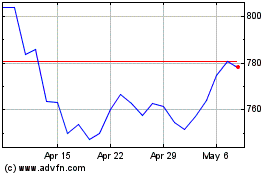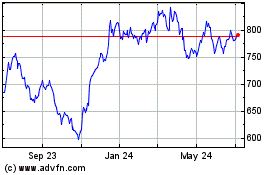By Asjylyn Loder
Investors radically slowed the torrent of cash flowing into
investment giant BlackRock Inc. this spring, a sign that a changing
global economy and trade rifts may be unsettling a decadelong
embrace of passive stock investing.
BlackRock said Monday it received $20 billion in net inflows in
the second quarter. While the sum is enormous, it was down from
more than $100 billion a year ago. BlackRock is the world's largest
asset manager and a bellwether of low-cost index-based
investing.
BlackRock isn't alone: For the first six months of 2018 the
amount of money going into all U.S. passive mutual funds and
exchange-traded funds was down 44% from the same period a year
earlier, according to data compiled by research firm
Morningstar.
Just as the simplicity of index ETFs made it easy and cheap for
investors to load up on a broad exposure to the stock markets, it
allows them to move out quickly at a time when many are questioning
the longevity of the bull market.
ETFs package stocks, bonds or other assets into a single share
that, unlike mutual funds, can be bought and sold on an exchange
just like shares of Apple or Amazon.
To be sure, money is still coming in to BlackRock and its peers.
Yet if anxiety deepens and markets begin to decline, the slowdown
shows these companies could suffer outflows.
For now, there have been only small signs of investor unease:
U.S. stocks continue to march upward in 2018. The S&P 500 is up
4.7% this year while the tech-heavy Nasdaq Composite has gained
13.1%.
"If it turns into a big, bad bear market, then I think we could
see outflows from ETFs," said Craig Siegenthaler, an analyst at
Credit Suisse Group AG. "There's been a lot of hot money that's
gone into equity ETFs in the past five years."
In an interview Monday, BlackRock Chief Executive Larry Fink
said the slowdown reflected growing investor uncertainty amid
political upheaval in Europe and worsening skirmishes over tariffs
between the U.S. and its trading partners. China and the European
Union are both battling the U.S. over tariffs that the Trump
administration said are needed to compensate for unfair trade
policies.
"One of the foundational components of international investing
is that globalization is good for the world and for world global
markets. The U.S. is throwing some of those foundational
assumptions into question," Mr. Fink said.
The slowdown at BlackRock, one of the landmark winners of the
post-financial-crisis world, comes as many analysts and investors
are on the lookout for signs of an end to the unprecedented rise of
low-cost, passively managed funds.
Such a move would reshape markets and the global economy given
that for much of the past decade, investor cash has surged into
BlackRock and fellow passive investing giant Vanguard Group. The
two companies hold more than $11 trillion in assets combined,
collecting it from institutional investors like banks, pensions and
hedge funds, as well as from individuals.
The slowdown in the $3.6 trillion ETF industry has been
particularly noticeable after last year's record gains. Investors
poured $123 billion of new cash into U.S. ETFs in the first six
months of 2018 -- down by about half from the same period last
year, according to data from Morningstar Inc. Inflows into Vanguard
ETFs also slowed, while State Street Corp.'s ETF business has seen
net outflows, according to Morningstar.
That risk aversion was apparent across BlackRock's businesses.
Investors bailed out of stock funds and instead sought the relative
safety of bonds, especially as rising returns on short-term debt
investments sweetened the appeal.
Mr. Siegenthaler noted that pension funds and sovereign-wealth
funds were both cutting back on stocks and instead opting for the
steady returns provided by debt investments. Institutional
investors yanked $21 billion in the second quarter from BlackRock
stock-index products that seek to match market benchmarks rather
than beat them, and instead invested $7.2 billion in products that
track bond indexes, BlackRock reported.
Retail investors acted similarly, pulling $1.6 billion from
BlackRock equity products, including mutual funds, while buying
$6.2 billion in bond investments.
Speaking generally, Jeffrey Costa, a trust and investment
officer at First County Advisors in Stamford, Conn., said his
mostly retail clients have been rattled by the escalating
tariffs.
"The biggest anxiety I'm seeing is new cash," said Mr. Costa
referring to clients with money to invest who are afraid that they
are too late in the current economic cycle to enjoy gains from the
stock market.
In all, investors pulled $22.4 billion out of BlackRock stock
products in the second quarter while buying $26.4 billion in fixed
income, the company said.
Mr. Fink said he remains optimistic about the future of ETFs,
which he predicted could reach $10 trillion to $12 trillion in
assets world-wide by the end of 2023. Flows were also slowed by
investors taking advantage of higher returns on money market
accounts, Mr. Fink said.
BlackRock's earnings rose 26% from the 2017 period, while
revenue grew 11%. Its shares fell 0.6% Monday to close at
$503.96.
"There's definitely some disappointment there," said Kyle
Sanders, an analyst at Edward Jones. "People got accustomed to
seeing record eye-popping growth every quarter."
Despite the slowdown in flows, BlackRock's profitability
expanded as the company made gains in other business lines.
Technology services revenue, including its Aladdin risk and
portfolio management tools, rose to $198 million, up 25% from the
same quarter last year.
Another bright spot was BlackRock's performance fees on actively
managed investments, which rose to $91 million, a 90% increase from
the 2017 quarter.
--Sarah Krouse contributed to this article.
Write to Asjylyn Loder at asjylyn.loder@wsj.com
(END) Dow Jones Newswires
July 16, 2018 19:58 ET (23:58 GMT)
Copyright (c) 2018 Dow Jones & Company, Inc.
BlackRock (NYSE:BLK)
Historical Stock Chart
From Mar 2024 to Apr 2024

BlackRock (NYSE:BLK)
Historical Stock Chart
From Apr 2023 to Apr 2024
